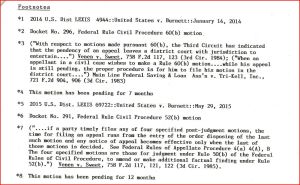
On behalf of Dennis Burnett, F.I.A.M, which fights for the wrongfully convicted and Human Rights would like to bring attention to Judge Gene E.K. Pratter’s tendency to dismiss prematurely valid claims and to inhibit pro se advocacy, thus, denying the function of a full and fair legal process.
We write to express our concerns about Judge Pratter’s legal decision in Dennis Burnett’s case because as shown by the ‘Opposition to Judge Pratter’s Nomination to the Third Circuit Court of Appeals’, Judge Pratter has a history of stifling advocacy of litigants by denying a full and fair opportunity to present their claims. This is a deeply serious matter that we urge you to investigate.
Below are facts (supported by the record) which conclusively show that Judge Pratter has exhibited a tendency to dismiss legitimate pro se advocacy by contravening circuit precedent and statutory laws, and applying wrong interpretations of law and fact.
In Burnett’s pro se collateral attack on his conviction (writ of habeas corpus) #1 he raised non-frivolous factual claims, which according to statute and circuit precedent, mandated an evidentiary hearing. Judge Pratter prematurely denied these claims without such a hearing, based on wrong interpretations of law and fact, thereby, denying Mr. Burnett opportunity to develop his claims. Despite evidence that his plea was involuntary and that his plea agreement entitled him to withdraw his plea, Judge Pratter dismissed his claim for lack of merit.
Subsequent to this denial Mr. Burnett, pro se, filed a motion pursuant to Federal Rules of Civil Procedure 60(b) #2 arguing there was a defect in the habeas proceeding, in part, due to Judge Pratter’s premature denial without the required evidentiary hearing. Judge Pratter issued an Order denying this 60(b) motion stating: ‘The Court lacks jurisdiction due to the pendency of Mr. Burnett’s current appeal’, despite the fact that pending appeal dealt with an entirely different claim. More importantly, Third Circuit precedent dictates that the filing of a notice of appeal does not divest a District Court of jurisdiction in entertaining a Rule 60(b) motion.
#3 Next, Mr. Burnett filed another pro se motion pursuant to Rule 60(b) #4 arguing ‘the district Court erred in denying hid previously filed 60(b) motion for lack of jurisdiction due to the pendency of his current appeal’. This motion is pending.
On or about April 23, 2015 Mr. Burnett, pro se filed a Hazel Atlas / Independent Action in Equity – Based on Fraud on the Court. #5 in his claims Burnett presented documented evidence establishing conclusively that his indictment was procured through fraud perpetrated through the Government. Judge Pratter sua sponte constructed this action as a second or successive 2255 and dismissed it for lack of Subject Matter Jurisdiction. She then transferred the action to the Third Circuit as an application to file a second or successive 2255.
Next, Burnett, pro se, filed a motion pursuant to Federal Rule of Civil Procedure 52(b) to Amend and Supplement Judge Pratter’s finding of fact and conclusions of law set out in the dismissal of his Hazel Atlas / Independent Action. #6 Judge Pratter again entered an erroneous Order denying this motion for ‘ lack of jurisdiction due to the pendency of his current appeal’ #7 Under controlling law, the filing of a notice of appeal does not prevent a District Court from actioning on a timely filed motion to amend or make additional factual finding under Rule 52(b) #8 Subsequent to the denial of the 52(b) motion, Burnett, pro se, filed a motion pursuant to Federal Rules of Civil Procedure 59(e) asking Judge Pratter to reconsider the denial of Rule 52(b) motion according to Circuit precedent. #9 this motion is also pending in the district Court.
F.I.A.M’s grave concerns in this matter are activated by Judge Pratter’s premature dismissal of Burnett’s collateral attack on his conviction, then, heightened by the erroneous dismissals of his motions on the basis of pending appeal, despite controlling law dictating the opposite. After Judge Pratter prematurely dismissed Burnett’s collateral attack the Government did not file anything in the District Court, let alone anything raising specific challenges to Burnett’s five valid claims. Judge Pratter, acting without the opposing party’s input or challenges, and dismissing his claims sua sponte without notice or opportunity to respond, bypassed the tradition of adversarial proceedings. Judge Pratter is conducting a private litigation with Burnett while the Government sits on the sidelines. The constitutional implications of these actions are disturbing; especially considering Burnett is proceeding pro se. To make sure the Judicial process is functioning properly, and because of the seriousness of Burnett’s claim of Fraud on the Court to which Judge Pratter may have acquiesced, F.I.A.M vigilantly urges you to investigate.
This letter and responses will be posted on F.I.A.M, to put the public in a better position to decide whether Judge Pratter functioned appropriately as a District Court Judge. Her history and Opposition to her appointment to Third Circuit Court of Appeals already speaks volumes.
F.I.A.M endeavors to root out and publicize the rampant corruption of the Criminal Justice System, and safeguard pro se – defendant’s rights. We can no longer hold on to the naive view that Courts, Judges and Prosecutors are not corrupt.
If you would like any information or documents pertaining to Burnett’s case, have any comments, or are willing to provide any assistance please email us at: freedomisamust911@gmail.com
